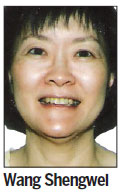Why Hong Kong must reinvent itself yet again
Updated: 2014-12-01 06:37
By Wang Shengwei(HK Edition)
|
|||||||
Thanks to its inherent determination, tenacity and initiative, Hong Kong has successfully reinvented itself several times over the last six tumultuous decades.
It was a fishing village and entrepot until the 1950s when the Korean War broke out. The subsequent US embargo on the Chinese mainland virtually ended the mainland's entrepot trade with Hong Kong. The city was to concentrate on industrialization, eventually becoming the economic bellwether of the four "Asian Tigers".
Mainland industrialists successfully developed Hong Kong into a labor-intensive hub for light industry.
The "made in Hong Kong" era outlived not only the oil crisis of the 1970s but also competition from the other Asian Tigers in the 1980s. However, by the 1990s over 80 percent of Hong Kong factories had been relocated to the mainland to benefit from its low labor and rent costs after the launch of Deng Xiaoping's "open door" policy.
Hong Kong has since become the re-exporter of "designed in Hong Kong, made in China" products and a trans-boundary manufacturing base. Today Hong Kong is one of the most service-oriented economies in the world and home to the highest concentration of banking institutions.

In 2012 Hong Kong's service sector generated 93 percent of GDP and, in 2013, provided 88.3 percent of total employment, whereas the manufacturing sector generated only 1.5 percent of GDP and 2.9 percent of total employment. In 2013 total value of trade in services grew by 4.9 percent from 2012 and the export of services generated 50 percent of GDP.
Before 1997 Hong Kong's per capita GDP was slightly higher than Singapore's. But by 2013 Singapore's nominal per capita GDP ($55,182) was well ahead of Hong Kong's ($37,955).
Singapore's resounding success can be attributed in great part to the pragmatic leadership of Lee Kuan Yew over three decades. He led the country to prosperity from its appalling situation in 1965, when its average unemployment rate hovered around 14 percent, nominal per capita GDP was $516 and its literacy rate was only 50 percent.
However, Hong Kong has never enjoyed the leadership of a politician or government official of Lee's caliber and the current "Occupy" sit-ins have only made things worse.
Hong Kong has four key industries: financial services, which generated 15.9 percent of GDP in 2012 (up 4.6 percent from 2011); tourism, which generated 4.7 percent (up 9.7 percent); trading and logistics services, which generated 24.6 percent (up 2.0 percent); and professional services and other producer services, which generated 12.8 percent (up 9.2 percent). The strong growth of 9.2 percent in this major sector reflected bright horizons for economic development.
Selected emerging industries including software, computer games, interactive media, art, crafts and architecture generated 4.9 percent of GDP in 2012 (up 9.2 percent from 2011). Among the emerging industries in Hong Kong, the cultural and creative industries have gained most international recognition. Medical services generated 1.5 percent of GDP in 2012. As Hong Kong's aging population will increase by 50 percent in the next 10 years, the medical services industry offers great growth opportunities.
Education services generated 1.1 percent of GDP in 2012 (up 13.2 percent from 2011). Growth in education sector reflected the increasing demand for private vocational, academic, tutorial and interest courses, self-financed university and post-secondary education services. This indicates another bright area for economic development.
The innovation and technology industry generated 0.7 percent of GDP in 2012. Though still small, this is a nascent area for launching R&D in the hi-tech sector. The testing and certification services industry generated 0.3 percent of GDP in 2012. This includes medical testing support in the diagnosis of illnesses, testing and inspection services for consumer products manufactured in Hong Kong and the Pearl River Delta area, and certification services for management systems. And finally a new sector, environmental industries, generated 0.3 percent of GDP in 2012.
Hong Kong must again reinvent itself to restore political stability and gradually bring balance to the economy.
The author is an independent scholar and freelance writer. She is also the founder and president of the China-US Friendship Exchange, Inc.
(HK Edition 12/01/2014 page9)